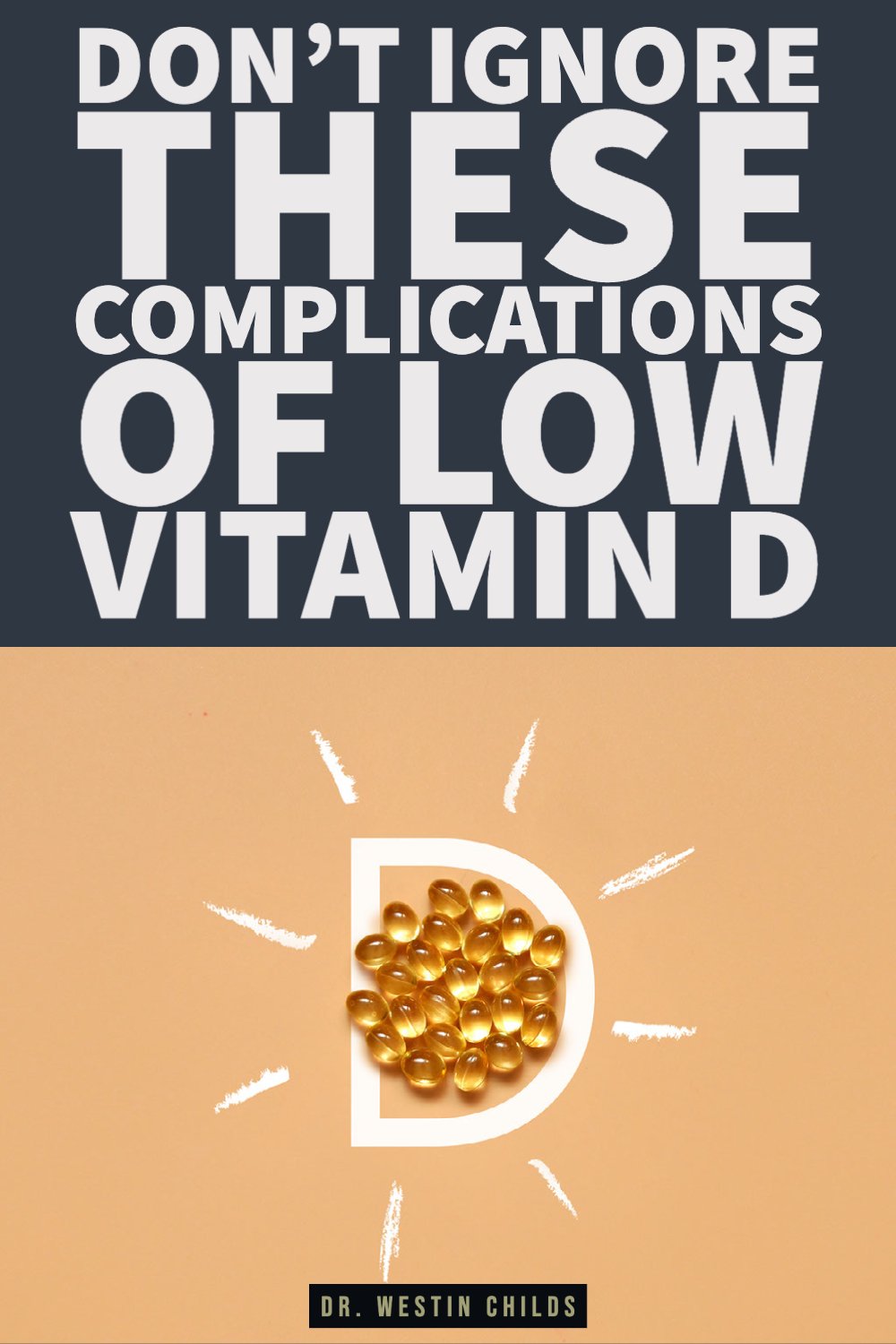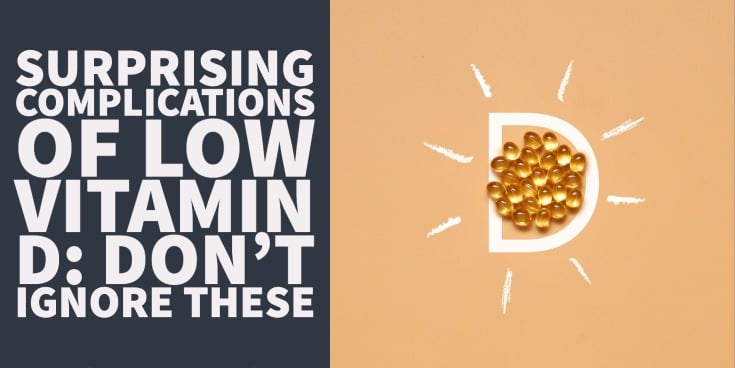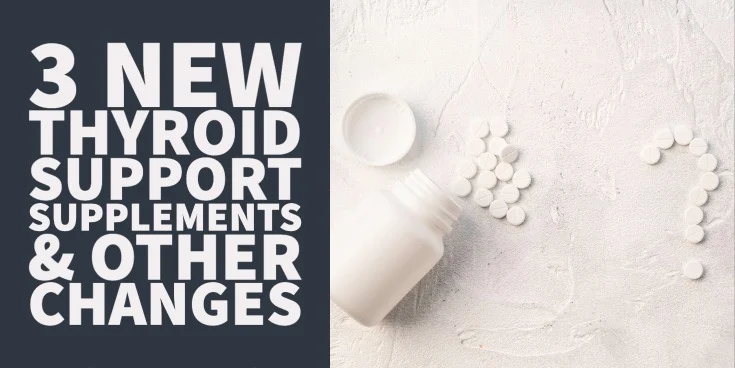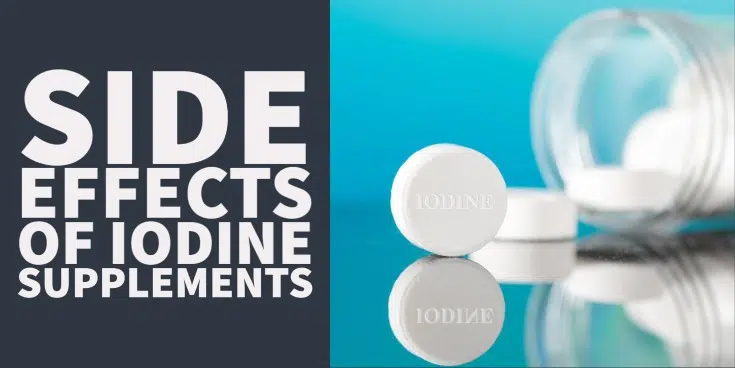Up to 1 billion people around the world don’t get enough vitamin D and there’s a very good chance that you are one of them.
Even though we call vitamin D a vitamin, it’s probably better to think about it as a hormone or a prohormone instead.
This is because vitamin D has a structure that’s more similar to a steroid or sex hormone than a vitamin.
And very similar to other hormones in your body, it plays a key role in regulating multiple organs and systems.
Another reason to think about vitamin D as a hormone is that it should help you understand why you need it so badly.
By now, you’re probably very accustomed to hearing about vitamin D, but how many of you are actually taking your vitamin D level seriously?
How many of you are exposing 40% of your body to sunlight every day for 20 minutes?
How many of you have had your vitamin D level tested in the last 6 months?
How many of you are taking a vitamin D3 supplement?
Not enough of you, that’s for sure, which is why I want to spend some time discussing why you should start caring more about it.
The symptoms of vitamin D deficiency can be hard to wrap your head around because they are generally non-specific.
In addition to being vague, having the symptoms doesn’t guarantee you have the deficiency.
And that’s because the symptoms have a lot of overlap with other diseases and medical conditions.
I’m going to tell you what these common symptoms are in just a second, but instead of focusing on them,
I want to spend more time on the unusual and more serious consequences associated with vitamin D deficiency.
You’ll understand what I mean in a minute.
But back to the more common symptoms, they include things like:
- Frequent illness or getting sick all of the time
- Fatigue or low energy
- Bone loss
- Muscle pain
- Skin issues
- Depression
Now, while these symptoms are certainly not ideal in terms of their impact on your life, they may not be enough to get you to take your vitamin D level seriously.
But if they aren’t enough, I think these conditions will be:
#1. Vitamin D deficiency increases your risk of developing autoimmune diseases of all types.
Put simply:
If your vitamin D level isn’t high enough, you are putting yourself at risk for autodestruction of your own organs and tissues.
This is what autoimmune disease is.
Your body misidentifies your own tissues as an enemy and attempts to kill them over time, just like it would a virus or bacteria.
Autoimmune disease can lead to serious consequences and symptoms that will impact your quality of life.
There’s evidence linking vitamin D deficiency to autoimmune diseases like
MS, rheumatoid arthritis, diabetes, inflammatory bowel disease, and lupus (1).
This is also why, by the way, patients with existing autoimmune diseases often take high doses of vitamin D to support their immune systems.
But in your case, it makes a whole lot more sense to take vitamin D now to prevent this problem from occurring as opposed to taking vitamin D as a treatment later on.
#2. Vitamin D deficiency increases your risk of developing Hair Loss of all types.
If there’s one symptom that people take VERY seriously, it’s hair loss and I understand why.
Hair loss can have a significant impact on your quality of life and your self-confidence.
So if maintaining your hairline is important to you, then your vitamin D status should be as well.
We know from studies that vitamin D deficiency has been linked to 3 different types of hair loss including (2):
- Telogen effluvium – This is the type of hair loss that occurs over your entire body and results in excessive hair shedding usually due to stress. It could be that low vitamin D sets your body up to be less resilient to stressors which means you are more likely to experience hair loss than the average person.
- The second is alopecia areata. This is a form of hair loss that is autoimmune-mediated. This is probably the most difficult type of hair loss to treat and the type of hair loss you want to try and prevent.
- The third is a special type of hair loss called androgenetic alopecia or male-patterned baldness. This type of hair loss can occur in both men and women and we know that
I wouldn’t consider vitamin D a true hair growth supplement but more of a preventative type of therapy.
Maintaining your vitamin D level protects you from hair loss as opposed to treating hair loss.
#3. Deficiency means you are more likely to be overweight.
Believe it or not, there appears to be a connection between your vitamin D level and being overweight.
There’s no question that people who are overweight have a hard time managing their vitamin D levels and require much higher levels of vitamin D.
This is because vitamin D is a fat-soluble vitamin/hormone, along with A, D, and K, so if you have extra fat in your body, there are more places to store it.
As a result, you’ll need a higher dose of vitamin D to account for this increase in fat mass.
What’s not so clear, though, is whether or not vitamin D deficiency CAUSES weight gain directly or if the relationship is just in one direction.
In other words, is it just that being overweight makes managing your vitamin D level more difficult, or does vitamin D deficiency lead to weight gain?

This is still being established but we do know from at least two large studies that people who have a low vitamin D level tend to gain MORE weight compared to those with a normal level (3).
When you think about just how important vitamin D is for the regulation of your tissues and organs, there’s definitely a possibility that these two things are directly connected.
But even if they aren’t, managing your vitamin D level is easy and should not be ignored.
#4. Vitamin D deficiency increases your risk of developing certain types of Cancers.
Unlike the connection between obesity and vitamin D deficiency, the connection between cancer risk and vitamin D deficiency is much more fleshed out.
Low vitamin D levels are associated with a higher risk of breast cancer in women and prostate cancer in men and this is really just the beginning.
One study highlights this perfectly (4):
“The high prevalence of vitamin D deficiency, combined with the discovery of increased risks of certain types of cancer in those who are deficient, suggest that vitamin D deficiency may account for several thousand premature deaths from colon, breast, ovarian, and prostate cancer annually”.
This suggests that vitamin D deficiency is a super simple, cost-effective way to mitigate your own personal cancer risk.
So if cancer risk is something that concerns you, and it should, then optimizing your vitamin D should be a priority.
You can opt to take the free route by going out in the sun each day or by taking the slightly more expensive route and getting your vitamin D from a supplement.
For those who like the more scientific explanation of how vitamin D prevents cancer, it works by:
- Blocking tumor blood vessel growth (known as angiogenesis)
- By enhancing the communication between healthy cells
- By limiting the proliferation of cancer cells
- And by maintaining healthy calcium levels in certain cells
#5. Vitamin D deficiency is associated with both type I and type II diabetes.
This is because vitamin D plays a role in regulating insulin secretion from the pancreas, which means low levels increase your risk of insulin resistance (5).
And because vitamin D deficiency results in inflammation and higher inflammatory markers.
This sets the stage for developing type I diabetes which is autoimmune-mediated.
As well as type II diabetes which is more inflammatory-based.
Diabetes and insulin resistance not only increase your risk of death from multiple causes, but it also results in a significant decrease in quality of life.
Current estimates suggest that up to 40% of adults have issues with insulin resistance making this a massive problem.
Taking vitamin D is not going to reverse your diabetes, but when combined with a healthy diet, carbohydrate reduction, fasting, and exercise, it’s definitely going to help.
There’s even some evidence to suggest that taking vitamin D can help normalize blood sugar levels in type I diabetes which suggests there is definitely a direct relationship between blood sugar and vitamin D.
And #6. Vitamin D deficiency increases your risk of developing Pain syndromes.
One of the primary symptoms of vitamin D deficiency is muscle weakness and muscle pain as I mentioned previously.
Part of this connection has to do with the processing of pain in the brain (6).
When vitamin D levels are low, you are much more likely to experience an augmented sense of pain.
You can think about it like this:
Imagine stubbing your toe when you have a headache.
Now imagine stubbing your toe after you just found $1,000 on the street.
Both result in the same amount of pain, but you will perceive the pain differently in both scenarios.
Being low on vitamin D is like stubbing your toe with a migraine, it just makes it feel a lot worse.
The pain is the same, but your perception of it is different.
The bottom line is that there are some very serious consequences associated with low vitamin D status, enough that you should take it very seriously.
Repleting Vitamin D Levels The Right Way
The good news is that it’s hard to replace your vitamin D.
In a perfect world, you would get your vitamin D directly from the sun, but if that’s not possible, you can always take a vitamin D3 supplement.
Taking 2,000 to 5,000 IUs of vitamin D3 each day should be enough to take you out of a deficiency and reduce your risk of all of the things we’ve discussed here today.
If you are going to take a vitamin D supplement make sure you are taking vitamin D3 (not D2).
It’s also a really good idea to combine your vitamin D with both vitamin A and vitamin K2.
The combination of vitamins A and D work synergistically together to prevent toxicity and vitamin K2 helps with the correct processing of calcium.
Vitamin K2 helps prevent calcium and plaque buildup in the arteries which improves heart health (7).
Finally, you will also want to consider taking magnesium along with vitamins A, D, and K2.
Magnesium helps your body activate and utilize vitamin D when it gets absorbed.
If you want to learn more about how I recommend increasing vitamin D rapidly then check out this article next.
Now I want to hear from you:
Were you aware of the importance of vitamin D?
Are you currently taking a vitamin D supplement?
If not, are you planning on increasing your vitamin D level after reading this?
Are you planning on getting your vitamin D level checked? Or have you checked it recently?
Leave your questions or comments below!
Scientific References
#1. ncbi.nlm.nih.gov/pmc/articles/PMC3166406/
#2. ncbi.nlm.nih.gov/pmc/articles/PMC8759975/
#3. ncbi.nlm.nih.gov/pmc/articles/PMC6780345/
#4. ncbi.nlm.nih.gov/pmc/articles/PMC1470481/
#5. ncbi.nlm.nih.gov/pmc/articles/PMC9671203/
#6. ncbi.nlm.nih.gov/pmc/articles/PMC4470966/
#7. ncbi.nlm.nih.gov/pmc/articles/PMC7238900/










I intend to buy your 5-bundle for thyroiditis. But I also have a Vit-D defiency.How much do I take(doctor said at least 5,000IU. But I also would a good multivitamin. I found out about3-4- years ago I was told by an endocrinologist that my thyroid has shrunk. Only about a 1/3 could be seen on the ultrasound. Only a month ago an ultrasound done showed shrinkage only a little left. two weeks ago a biopsy on a nodule showed suggested of thyroiditis and I didn’t know this until now. i got an old report from a former doctor which said that I had tested positive for thyroiditis antibodies and wasnt told at that time..For years I took a mulitple vitamin and D3 to boot but those were not good ones apparently .Nothing was helping thyroid and or the calcium so I quit taking them. I am deficient and the energy is so low I cant even finish any task without sitting down for a while sometimes two hours before getting up and trying again. My hair is falling out. Something in the multiple vitamin was helping my hair before I stopped the vitamin.. I took that for several years but energy started getting worse so I figured the multiple vitamin wasnt good enough. The endocrinologist said she was sorry she couldn’t find the cause of the energy depletion – changed me from Armour to synthroid to get my numbers to where they should be. But the energy never improved. it got worse and i get up to move around and huffing and puffing doesn’t describe it and weakness started to get really bad.. sit down or fall down.I need to know what all I need to take because it looks like I may have to combine some products together. So how do I avoid getting to much of one or another? I am at this time going ahead to purchase the 5-Thyroiditis Bundle but I do need the other things too. Thanks for listing.
Hi Sheryl,
All of my supplements are intended to be taken together so there is no need to worry about taking too much of any one ingredient. If you need further assistance, feel free to reach out to my team at hello@restartmed.com and we can help you there.
What do you think about the Vitamin D order of magnitude mistake made in the Federal RDA Guidelines ? https://pubmed.ncbi.nlm.nih.gov/25002004/
This other article indicates that doses of up to 10,000 units of Vitamin D a day are safe for most patients – https://www.ncbi.nlm.nih.gov/pmc/articles/PMC8709011/ and for obese patients may well be necessary.
Hi Molly,
I wasn’t aware of the first study but the dosing mentioned there of 2,000 to 5,000 IU/day tracks right in line with my clinical experience. And, yes, higher doses are necessary for those who are overweight. I mention that concept in this video (which will soon become a blog post) : https://youtu.be/O3OIxj2H3SY
Hi Dr Child’s, I’m on activated d3 under medical supervison but my levels are still low, would it be okay to take normal vit d3 as well to build up my levels?. I had thyroid removed because of cancer and now am a laryngectomy because a recurrence took my voice box.
What kind of magnesium do you recommend taking with the D3?
Hi Mindy,
I generally recommend magnesium glycinate complex. You can see an example here: https://www.restartmed.com/product/thyroid-daily-essentials-thyroid-multivitamin/
You can also learn more about various forms of magnesium here as well: https://www.restartmed.com/best-and-worst-forms-of-magnesium/
Hi Dr childs
Many thanks for your continuous support
And useful information.
Does thyroid medication cause tremors
And siezures …I have some tremors and some times full body shaking every six month since I started thyroid medication two years ago ..I haven’t still achieved the
Proper tch and t4 levels so definitely no
Hyperthyroidism.
I would appreciate if you can guide me
I have seen encorolgy and neurology doctors but with no use .
Thanks and kind regards
Babikir malik
I have alkaptonuria too from birth
When is the best time to take Vit D. Morning? evening? With or without food.
thanks
Susan Croke
Hi Susan,
It’s best to take vitamin D with a fatty meal.
Thank you! I didn’t realize the relationship to diabetes. My A1C has been rising and my Vit D was so low that my doctor put me in a rx of 50,000 once a week for 12 weeks. Should I be re-tested at the end of the 12 weeks? She said just to take a supplement after that. I have Hashimotos and am only on T3. I also have MTHFR but I’m not sure which variant. I know that plays a role in absorption and would like to see an article about that.
The physiology of magnesium metabolism is integral to converting vitamn D2 to D3. Remember somewhere along the way that low magnesium causes low vitamin D3 and low vitamin D3 causes low magnesium, since vitamin D stimulate the gut to absorb the magnesium. if vitamin D is low you can bet magnesium is low. The most interesting article is by Carolyn Dean MD and naturopath who wrote, “The Magnesium Miracle” at the Huffington post.
Domino Drug Therapy for Heart Disease
HuffPost
https://www.huffpost.com › entry › domino-drug-the…
Sep 3, 2010 — Carolyn Dean, M.D., N.D., Contributor. Medical doctor and naturopathic doctor. Suggest a correction.
Joann Love MD.
Hi Joann,
Thanks for sharing. I described the connection between magnesium and vitamin D more in this article for those who are interested: https://www.restartmed.com/rapidly-increase-vitamin-d-for-better-thyroid-health/
Hi Dr. Childs,
I am taking 3000 Vitamin D3 and my bloodwork comes back with flags for the last couple years saying my Vitamin D is low and my calcium is too high. Any recommendations? My doctor ignores it and my rheumatologist keeps asking me to ask my family doctor what he is doing for it. No one wants to tell me anything. I do have Hashimotos, and at that time Sjogrens and Vitiligo all showed up together just about premenopause time. My uterine lining is still “growing” post menopause so I am on progestin to help with that.
Hi Pauline,
I would recommend checking out this article which explains how to quickly raise vitamin D levels: https://www.restartmed.com/rapidly-increase-vitamin-d-for-better-thyroid-health/
I am an informed patient and I am not sure doctors really like informed patients. When I learned I had a brain tumor, (a craniopharyngioma), I wanted to learn about the surgery to remove it. From there I learned about the conditions my brain tumor left me with. Since my surgery I went through a forced menopause and osteoporosis is a threat. I am on meds for hypothyroid, diabetes insipidus, adrenal insufficiency and growth hormone replacement. I also take 5000iu vitamin D3 with K2. I intend to begin taking Vitamin A.
All the above aside I would like to point out that after my brain surgery, instead of waiting a bit to see if my pituitary, adrenals and hypothalamus could recover and function properly, I was put on high enough doses of meds to suppress those functions. I have been on them ever since.
My question to you is this: why a suppression dose? Why not a smaller dose to supplement instead of stopping my organs from doing what they should be doing. Where is the wisdom in suppressing an organs natural functions? I asked an endocrinologist this question and the only response I got was: Hmmmmm! Good question!
Thank you!